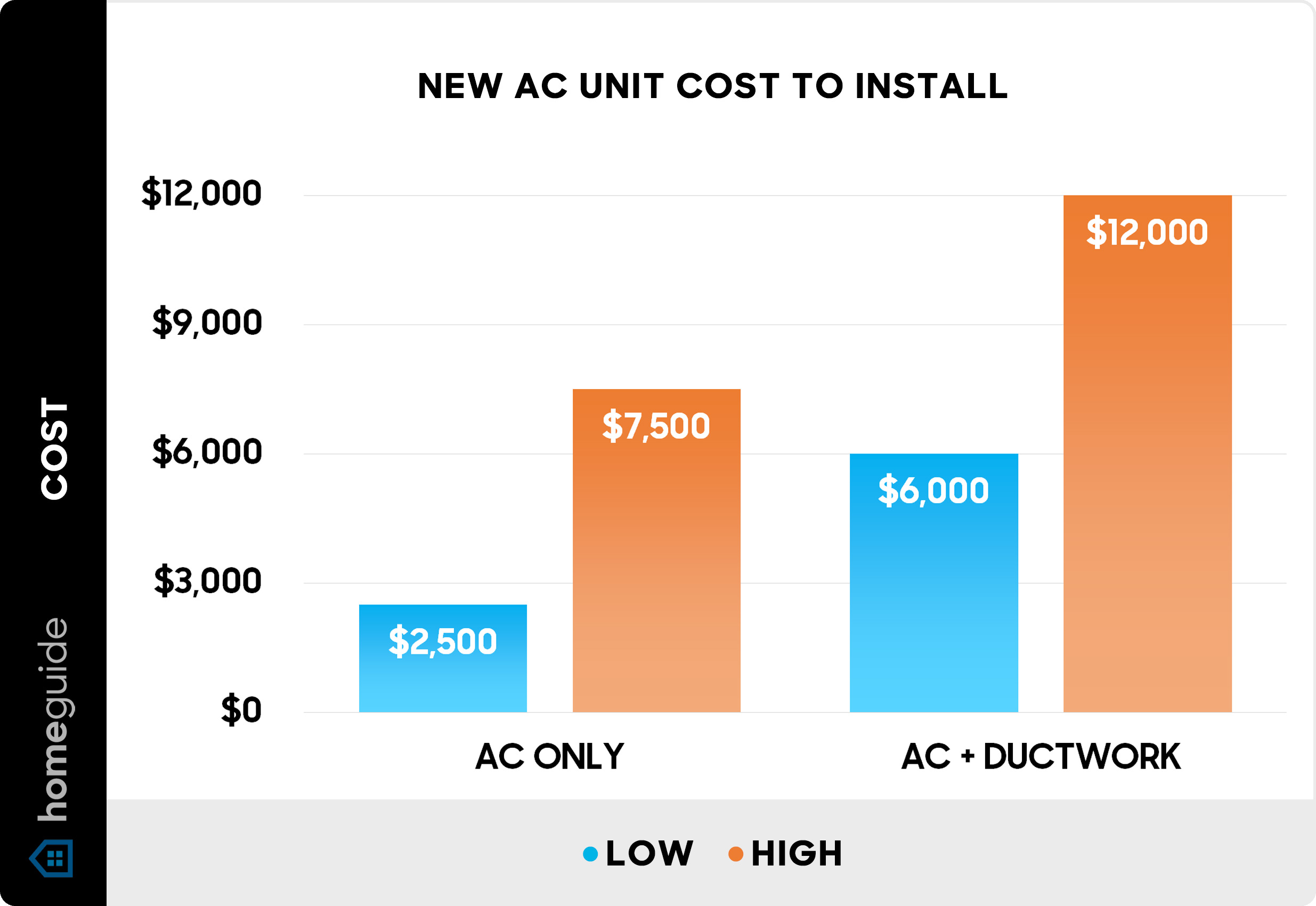If you find yourself in need of a replacement AC unit for your 2500 square foot house, you might be wondering what the cost should be. With so many factors to consider, it can be challenging to find accurate information. In this article, we will explore the various elements that affect the cost of a replacement AC unit for a house of this size. From the size of the unit to the efficiency rating, we will provide insights to help you make an informed decision. So, let’s dive in and explore how much a replacement AC unit should cost for your 2500 square foot house.
Factors Affecting the Cost of AC Units
When it comes to purchasing an AC unit for your home, there are several factors that can affect the cost. Understanding these factors will not only help you make an informed decision, but it will also ensure that you get the right AC unit for your needs. Let’s dive into the various aspects that can impact the cost of AC units.
Type of AC Unit
One of the first factors that can influence the cost of an AC unit is the type of unit you choose. There are several options available on the market, each with its own advantages and price range. Let’s explore some of the most common types of AC units.
Central Air Conditioning
Central air conditioning is a popular choice for cooling larger spaces, such as entire houses or commercial buildings. These systems work by distributing cool air through ducts and vents. While central air conditioning units tend to be more expensive upfront, they offer efficient cooling and can help maintain a comfortable temperature throughout the entire house.
Ductless Mini-Split Systems
Ductless mini-split systems are a suitable option for cooling individual rooms or smaller homes. As the name suggests, these units do not require ductwork, making them a flexible and cost-effective solution. Ductless mini-split systems consist of an outdoor unit and one or more indoor units, allowing for personalized cooling and temperature control.
Heat Pumps
Heat pumps are versatile units that can be used for both cooling and heating purposes. They work by transferring heat from one location to another, depending on the season. While heat pumps may have a higher upfront cost, they can help save on energy bills in the long run by providing efficient heating and cooling throughout the year.
Packaged Terminal Air Conditioners
Packaged terminal air conditioners (PTACs) are commonly found in hotels or apartment buildings. These units are designed to be mounted through a wall or window and provide heating and cooling in individual rooms. PTACs are a budget-friendly option for smaller spaces and offer convenient temperature control.
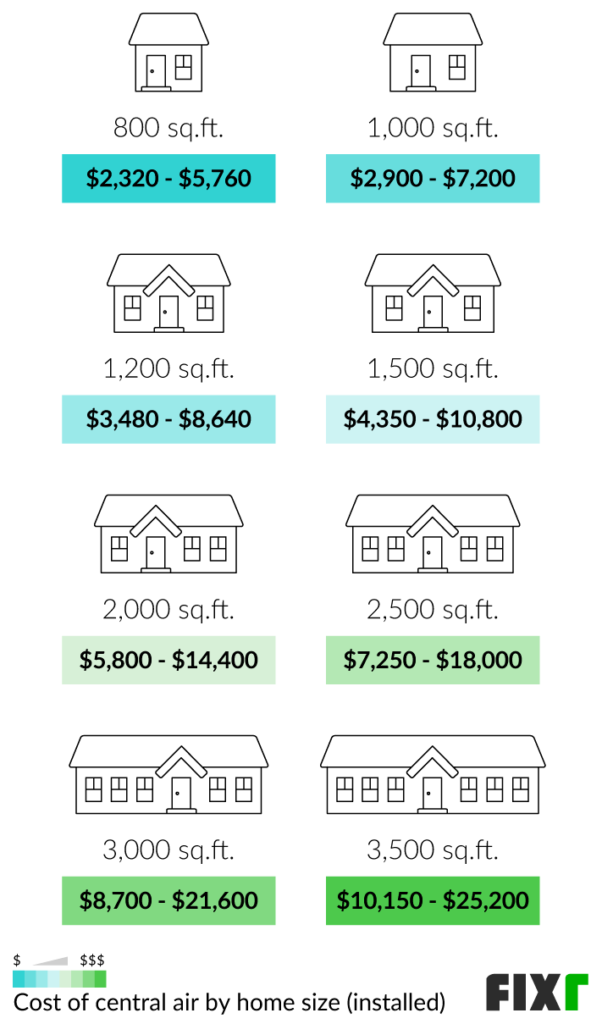
SEER Rating
Another crucial factor that can impact the cost of an AC unit is its SEER rating. SEER stands for Seasonal Energy Efficiency Ratio, and it measures the cooling efficiency of an AC unit. The higher the SEER rating, the more energy-efficient the unit is. Let’s take a deeper look into the importance of SEER rating and its impact on the cost.
Understanding SEER Rating
SEER ratings typically range from 13 to 25, with higher ratings representing greater energy efficiency. In simple terms, a higher SEER rating means that the AC unit can provide the same cooling output with fewer energy consumption.
Impact on Cost
AC units with higher SEER ratings tend to come with a higher price tag. This is because these units utilize advanced technology and components to achieve superior energy efficiency. However, it’s important to keep in mind that although the initial cost may be higher, an AC unit with a higher SEER rating can help save on energy bills over time.
Importance of SEER Rating
Choosing an AC unit with an appropriate SEER rating for your needs is crucial. While an AC unit with a high SEER rating may seem like the obvious choice, it’s essential to consider factors such as your climate, average usage, and budget. Consulting with a professional HVAC technician can help you determine the ideal SEER rating for your specific requirements.
Size of the House
The size of your house plays a significant role in determining the cost of an AC unit. It’s essential to select a unit that can effectively cool your entire home without overworking or underperforming. Let’s explore how to calculate the appropriate AC unit size and ensure optimal cooling efficiency.
Calculating AC Unit Size
Measuring the size of your house in square footage is the first step in determining the appropriate AC unit size. However, square footage alone doesn’t provide an accurate estimation. Other factors, such as the number of windows, insulation quality, and ceiling height, also need to be considered.
Determining the Correct Size
To determine the correct AC unit size for your house, it’s best to consult with an HVAC professional. They will perform a comprehensive evaluation, taking into account factors such as insulation, window orientation, and number of occupants. This ensures that you select an AC unit with the appropriate cooling capacity, leading to optimal performance and energy efficiency.
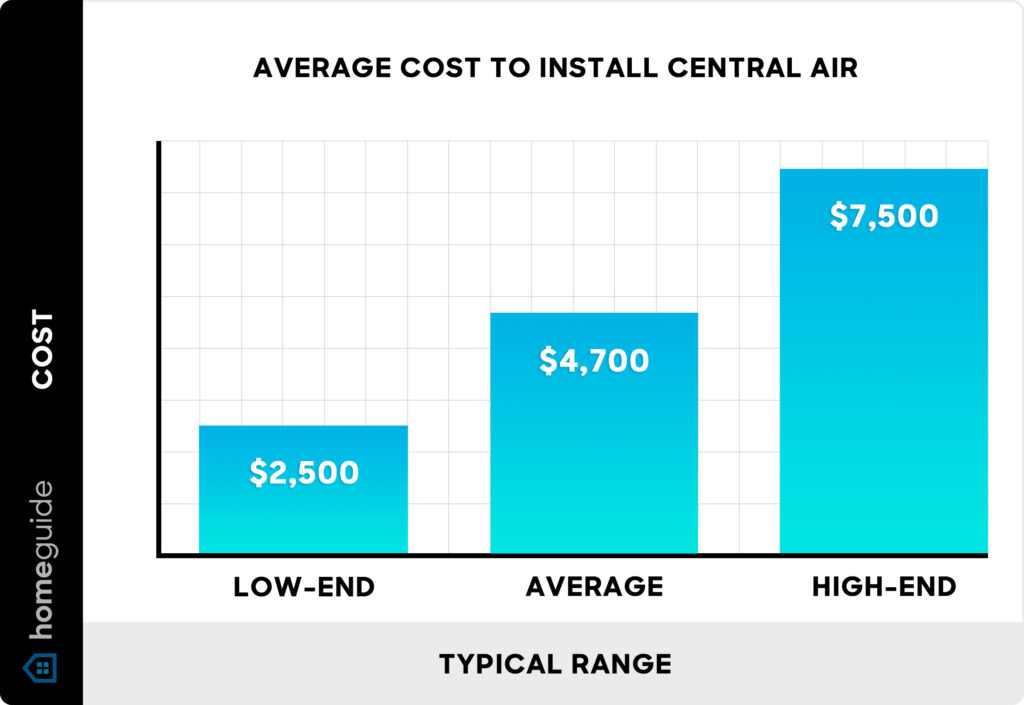
Energy Efficiency of the House
The energy efficiency of your house is another important factor to consider when it comes to the cost of an AC unit. A well-insulated and energy-efficient home can significantly impact the cooling requirements and, subsequently, the cost of the AC unit. Let’s explore how certain aspects of your house can affect its energy efficiency.
Insulation
Proper insulation is essential for maintaining a comfortable indoor environment and reducing energy consumption. Inadequate insulation can lead to significant energy losses, as cool air can escape during hot summer months. Upgrading insulation in your house can not only help improve energy efficiency but also reduce the burden on your AC unit, potentially lowering its cost.
Windows and Doors
Inefficient windows and doors can contribute to heat gain during summer months, leading to increased cooling needs. Energy-efficient windows and doors with proper sealing and insulation can help prevent heat transfer, ensuring that cool air produced by your AC unit remains inside. Upgrading to energy-efficient windows and doors may entail an upfront cost, but it can result in long-term savings in terms of reduced energy bills.
Overall Energy Efficiency
Considering other energy-efficient measures, such as using energy-saving light bulbs, optimizing appliances, and sealing air leaks, can further enhance the overall energy efficiency of your house. An energy-efficient home not only reduces the cooling requirements but also creates a more comfortable living space while saving on energy costs.
Additional Features
AC units come with an array of additional features that can impact their cost. While some of these features may seem like luxuries, they can also provide added comfort and energy-saving benefits. Let’s explore some popular additional features found in modern AC units.
Variable Speed Technology
AC units with variable speed technology allow the compressor and fan to adjust their speed based on the cooling demands. This advanced technology not only provides precise temperature control but also helps optimize energy consumption. While AC units with variable speed technology may have a higher initial cost, they often result in long-term savings due to increased energy efficiency.
Smart Thermostats
Smart thermostats are becoming increasingly popular due to their ability to optimize energy usage and provide remote control capabilities. These thermostats can learn your schedule, adjust temperature settings accordingly, and even be controlled through smartphone apps. While smart thermostats may add to the cost of an AC unit, their energy-saving features can help offset the initial investment.
Zoning Systems
Zoning systems divide your house into different climate zones, allowing for customized temperature control in each area. This can be particularly beneficial for larger houses with varying cooling requirements. Zoning systems can help save energy by directing cool air only to the areas that need it, resulting in increased comfort and potential cost savings.
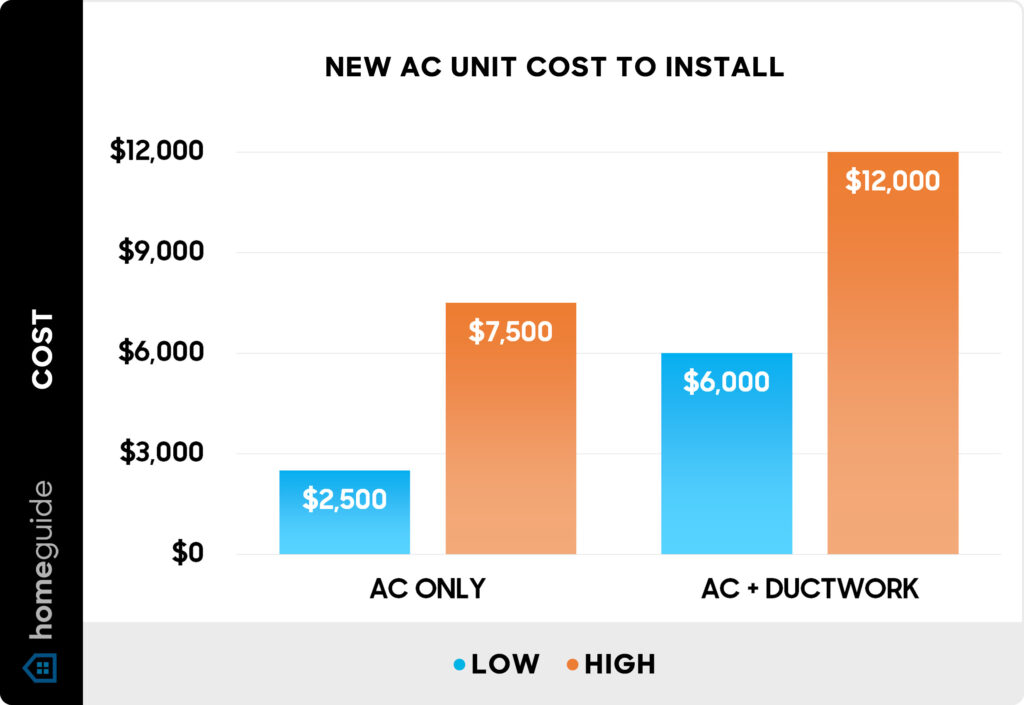
Average Cost of AC Units
Understanding the average cost of AC units can provide a general idea of what to expect when budgeting for a replacement unit. While the actual cost can vary based on several factors, including brand, features, and installation requirements, it’s helpful to have a baseline. Let’s explore the national average cost and the price range for AC units.
National Average
As of the time of writing this article, the national average cost for a replacement AC unit typically ranges from $2,500 to $7,500. This range includes the cost of the unit itself, as well as the installation fees. However, it’s important to note that these numbers are approximate and can vary depending on your location and specific requirements.
Range of Prices
The price range for AC units can vary significantly based on several factors. Basic, entry-level AC units with lower SEER ratings and minimal additional features tend to be more affordable. On the other hand, high-end units with advanced technology, higher SEER ratings, and additional features can have a higher price tag. It’s important to consider your specific needs and budget when selecting an AC unit.
Cost Breakdown
To better understand the cost of AC units, it’s important to break down the expenses involved. By understanding the various cost components, you can allocate your budget effectively and make informed decisions. Let’s explore the breakdown of costs associated with AC units.
AC Unit Cost
The cost of the AC unit itself typically makes up a significant portion of the overall expense. As mentioned earlier, the price can vary depending on factors such as the brand, type, SEER rating, and additional features. It’s important to explore different options and consider factors such as energy efficiency, durability, and warranty while assessing the unit cost.
Installation Cost
The installation cost includes expenses associated with labor, materials, and any additional peripherals required for proper installation. The complexity of the installation process and the specific requirements of your house can impact the overall installation cost. It’s recommended to hire a professional HVAC technician to ensure proper installation and optimal performance of your AC unit.
Additional Costs
In addition to the AC unit and installation costs, there may be ancillary expenses to consider. These can include permits, electrical upgrades, ductwork modifications, or any necessary repairs or replacements associated with the installation process. Consulting with an HVAC professional can help you estimate any additional costs and plan your budget accordingly.
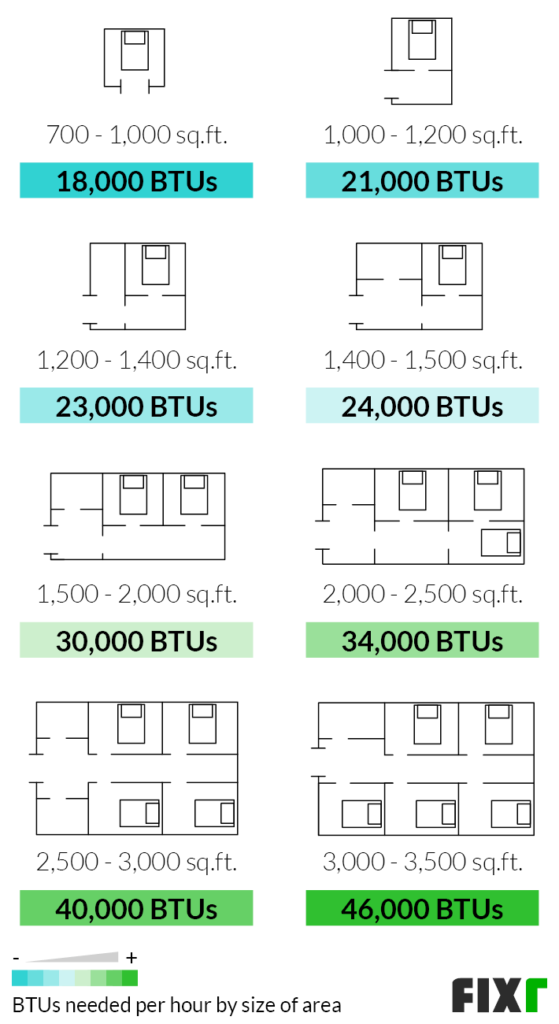
Obtaining Multiple Quotes
When purchasing an AC unit, it’s always beneficial to obtain multiple quotes from reputable HVAC contractors. Comparing prices and evaluating the services offered by different contractors can help you make an informed decision. Let’s delve into the importance of obtaining multiple quotes and factors to consider during the process.
Comparing Prices
Obtaining multiple quotes allows you to compare prices and assess the scope of services included. While it may be tempting to go for the cheapest option, it’s crucial to consider the reputation, experience, and customer reviews of the contractors. Balancing price and quality ensures that you receive reliable service and value for your investment.
Considering Warranties and Maintenance
When assessing quotes, it’s important to inquire about warranties provided by the contractor, as well as any manufacturer warranties associated with the AC unit. Warranties can provide peace of mind and protect you from unexpected expenses in case of equipment malfunctions. Additionally, inquire about ongoing maintenance services, as regular maintenance can help extend the lifespan and optimize the performance of your AC unit.
Professional Installation vs. DIY
One of the considerations to ponder when installing an AC unit is whether to hire a professional or attempt a DIY installation. While it may be tempting to save on costs by opting for a DIY approach, there are several benefits to hiring a professional HVAC technician.
Benefits of Professional Installation
Professional HVAC technicians have the knowledge, skills, and tools required to handle the installation process efficiently. They are familiar with local building codes and safety regulations, ensuring that the installation is done correctly and meets all requirements. Professional installation also minimizes the risk of errors or damage that can occur during a DIY project, saving you from potential additional expenses.
Potential Issues with DIY Installation
Attempting a DIY installation, especially without prior HVAC experience, can result in costly mistakes or even pose safety hazards. Improper installation can lead to compromised performance, reduced energy efficiency, and frequent breakdowns. In some cases, DIY installation may also void the warranty provided by the manufacturer. To ensure peace of mind and optimal performance, it’s advisable to leave AC unit installation to the professionals.
In conclusion, several factors can influence the cost of AC units for your home. It’s important to consider the type of AC unit, its SEER rating, the size of your house, the energy efficiency of your home, and additional features when making a selection. Obtaining multiple quotes from reputable HVAC contractors will help you make an informed decision, balancing price and quality. Remember, professional installation is key to ensuring optimal performance and longevity of your AC unit. By carefully considering these factors, you can select the right AC unit for your needs and create a comfortable and energy-efficient living space.


